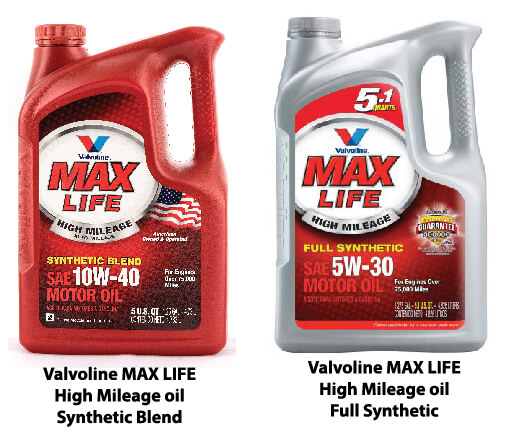Choosing the Best Oil for a High Mileage Engine
Learn about the oil needs of a high-mileage engine
As vehicles age and accumulate miles, their engines show wear and tear signs. High-mileage engines, typically those with over 75,000 miles, require special attention to maintain performance, reduce wear, and prevent leaks. One of the most effective ways to care for an aging engine is using the right motor oil. This article delves into the best oils for high-mileage engines, explains the benefits, and debunks some myths surrounding the right oils for these engines.
What high-mileage engines need
• Seal conditioners— The neoprene seals in older engines tend to harden and crack. All motor oil contains a seal conditioner additive. But many older engines can benefit from a higher dose of these conditioners
• More detergent and dispersants—Older engines experience slightly more blow-by, and those gases introduce more fuel, moisture, and soot into the crankcase. Additional detergent helps prevent sludge formation, and a higher dose of dispersant additive helps move more particulate matter to the filter so it can be captured.
• More anti-wear additives— Wear in high friction areas causes a slight drop in oil pressure in those critical areas, resulting in additional wear. A higher dose of anti-wear additives can reduce some of that extra wear.
• A Boost in Viscosity Index Improvers (VII)— VII is a wear item that’s damaged by shear forces. As bearing clearances expand due to wear, those areas cause more VII shear, lowering the overall viscosity of the remaining oil. Additional VII, helps lower the amount of viscosity reduction in older engines.
Should you switch to a high-mileage oil?
High-mileage (HM)motor oils are specifically formulated to address the unique needs of older engines. These oils contain special additives that help reduce oil consumption, minimize leaks, and decrease engine wear.
I’m not convinced that 75,000 miles is the magic number for every owner to switch to HM oils. I think the decision depends on how well you’ve maintained the vehicle from the beginning, how it’s running now, and how you drive. For example, I think if you have over 125,000 miles, have followed the carmaker’s recommendations for oil changes, and drive with a heavy foot or haul heavy loads, your engine would benefit from HM oil. If you haven’t maintained it well, switching over at 75,000 might make the most sense.
My thoughts on adding an oil stabilizer additive
My opinion on oil stabilizers is pretty clear. Don’t use them! Oil stabilizers are nothing more than VII. It’s not a lubricant. Yes, your old engine needs more VII. But not at the cost of using less oil! To use a quart of stabilizer, you have to reduce the amount of oil by the same amount. Using one less quart of oil reduces the amount of detergent, dispersant, anti-corrosion, anti-wear, and anti-foaming additives in your crankcase by as much as 25%.
My recommendations for the best high-mileage oil
Valvoline was the first company to introduce HM oils and I think their product is still the best one out there. If you’re going to switch, choose a full synthetic Valvoline HM oil and follow the carmaker’s recommended viscosity.

High mileage oil is available as a synthetic blend or full synthetic. Full synthetic high mileage oil provides the best protection for older engines
Now, let’s debunk the higher viscosity myth
Many self-proclaimed “oil experts” recommend using a higher-viscosity oil on high-mileage engines to reduce oil consumption. The reasoning is that because the piston rings have more wear, they’ll benefit from a thicker oil’s ability to seal the rings to the cylinder wall. There’s a smidgen of truth to that advice. A heavier viscosity oil will get you more film strength. But there’s no free lunch here. Using a higher-viscosity oil has serious drawbacks, like accelerated engine wear, lower fuel economy, and lower performance.
The serious downsides to using a higher viscosity oil in an older engine
• Using a higher-than-recommended viscosity oil causes faster wear. Higher viscosity oils don’t flow as easily, inhibiting their ability to remove heat from high-friction areas. So those areas encounter more wear. In addition, a higher viscosity oil generates internal friction due to higher resistance to flow, making the heat problem even worse. If you use a higher viscosity oil in your old, worn engine, you won’t have to worry much longer about the high oil consumption because you’ll wear out your engine even faster.
If using a heavier-weight oil actually worked better to reduce oil consumption, then it would seem to make sense you should use the highest viscosity oil available. Yet, no one with any common sense would purposely pour 120-weight oil into their crankcase.
• Using a higher-than-recommended viscosity oil negatively affects the operation of variable valve timing (VVT) mechanisms. It creates more wear in turbochargers— VVT mechanisms advance and retard camshaft timing by pulsing oil into and out of the phaser chambers. The pulse timing assumes you’ve filled the crankcase with the recommended oil viscosity. If you use a higher-viscosity oil, you degrade the performance of the VVT system, resulting in lower fuel efficiency and power.
When it comes to the turbocharger, upping the viscosity is the worst thing you could do. A thicker oil reduces flow and that reduces cooling; not something you want to do on a device that spins at up to 300,000 RPM.
How about using a higher-viscosity oil to fix a low-oil pressure problem?
Viscosity is a measurement of a liquid’s resistance to flow. The higher the viscosity, the more it resists flow. If you use a higher viscosity oil in an engine with a low oil pressure problem, the oil will increase oil pressure slightly. But it accomplishes it at the expense of flow. Lower oil flow reduces the oil’s ability to remove heat, causing increased wear, which results in more wear. ….which lowers oil pressure. Get the picture?
©, 2015 Rick Muscoplat
Posted on by Rick Muscoplat